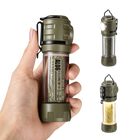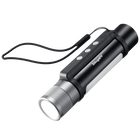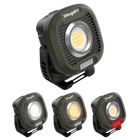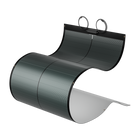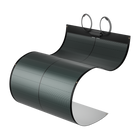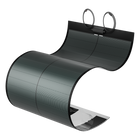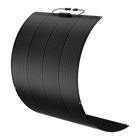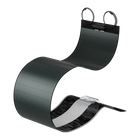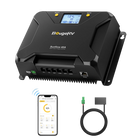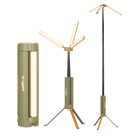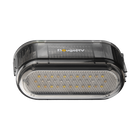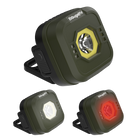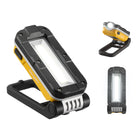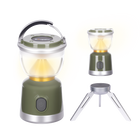What Size Solar Panel Do I Need to Run a 12V Fridge?(with Chart)

When you're hitting the road in your truck camper, finding peace in the great outdoors with camping, living it up RV-style, boondocking, or embarking on an overlanding journey – whatever your style, one thing you don't want to compromise on is access to fresh food and cold beverages. A 12V fridge is pretty much your go-to buddy for that. Solar panels offer a green and reliable power source for your cooling needs, but nailing the right size is key to meeting your fridge’s energy demands.
In this blog, you will learn how many watts your 12V fridge uses per hour and per day, the correct solar panel size to power a 12V fridge, components, and tips to make your fridge run more smoothly and efficiently.
Let’s dive in!
Solar Panel Size Chart for 12V Fridges
Assume that each fridge has an average duty cycle of 1/3, meaning the compressor runs approximately 33% of the time.
The suggested solar panel sizes include a buffer to account for inefficiencies in the system, including losses in the charge controller, battery, and inverter (if used). For simplicity, we'll assume an average system efficiency of about 80%, and 5 peak sun hours per day a common average for many regions.
Here's a table that displays the daily wattage consumption for 12V fridges ranging from 20 to 60 quarts and recommends the solar panel size needed for each fridge.
|
Fridge Size (Quarts) |
Est. Power Consumption (Watts) |
Daily Energy Use(Wh/day) |
Recommended Solar Panel Size (Watts) |
|
20Quart |
40W |
320Wh |
100W |
|
30Quart |
50W |
400Wh |
120W |
|
40Quart |
60W |
480Wh |
140W |
|
45Quart |
65W |
520Wh |
150W |
|
50Quart |
70W |
560Wh |
160W |
|
55Quart |
75W |
600Wh |
180W |
|
60Quart |
80W |
640Wh |
200W |
*This chart is meant to give you ballpark figures. If you want to nail down the specifics, you'll need the exact power consumption details for your particular fridge model or the one you're eyeing. Plus, you'll have to consider how much sun your area gets to size your solar panel just right.
*In reality, the duty cycle can be affected by ambient temperature, how often the fridge is opened, the amount of contents, and the efficiency of the fridge.
12V Fridge's Power Requirements
On average, a 12V fridge typically consumes between 40-80 watts per hour depending on size, insulation, and efficiency. Considering the fridge cycle on and off throughout the day, the 12V fridge typically uses 320Wh~640Wh per day. Solar panels rated at 100W, 200W, or higher can effectively run these 12V fridges.
Over at BougeRV, though, we provide seriously energy-efficient portable 12V fridges that come in sizes from 23 Quart to 59 Quart, and they only need 36 to 60 watts per hour and less than 1KWh per day.
Easy Steps on Calculating Solar Panel Size for Your Fridge
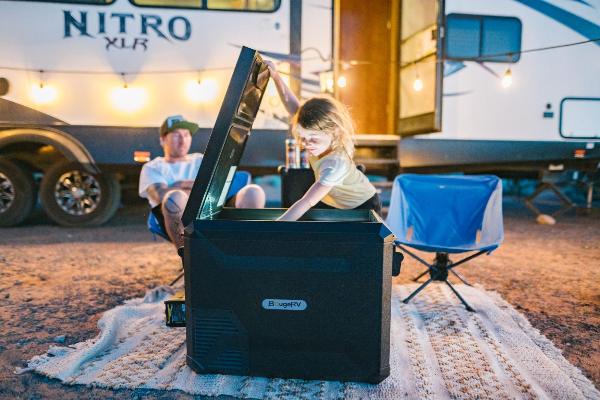
Let’s take a look at how to calculate the proper solar panel size required for your fridge by following these simple steps
Again, let's assume each fridge has an average duty cycle of one-third. This means the compressor runs about 33% of the time, which works out to be almost 7.92 hours per day.
Step1: 12V Fridge Daily Energy Use Calculation:
Power Consumption (W) x 7.92 hours = Daily Energy Use (Wh)
Step2: Solar Panel Size Calculation (With Buffer):
(Daily Energy Use / Average Sun Hours) / System Efficiency = Minimum Required Solar Panel Size
Then, adding a buffer of 20-25% to the minimum required size for reliability:
Minimum Required Solar Panel Size * 1.25 = Recommended Solar Panel Size
Let's do a quick example calculation for a 20-quart fridge that uses around 40 watts of power:
Fridge Daily Energy Use = 40W x 7.92h ≈ 320Wh/day
Minimum Required Solar Panel Size = 320Wh / 5h / 0.8 = 80W
Recommended Solar Panel Size = 80W * 1.25 ≈ 100W
Therefore, you can run this 20-quart fridge using a 100W solar panel or solar panels that total around 100 watts. Keep in mind this is a rough estimation, and actual requirements can vary based on location, weather, fridge efficiency, battery storage capacity, and other factors such as the duty cycle of the fridge (how often it runs vs. how often it's off).
By the way, it's smart to go a bit bigger on the solar panel size to ensure everything runs smoothly, especially if you've got a lot of appliances like your fridge, TV, and other gadgets all going at once.
Additional Components for Your Solar-Powered Fridge System
1. Batteries or Power Stations for Energy Storage
A battery bank or a portable power station is essential to store the energy generated by your solar panels. The capacity should be large enough to store power for days with less sunlight and to provide overnight power. Typically, a 100Ah battery would match well with a solar system designed to meet low-energy needs.
The portable power stations are super convenient. Many come with multiple output types, including a 12V port perfect for your 12V fridge. Plus, they're easy to carry around, so you can easily take one with you, whether you’re heading out in a truck, RVing, camping, hitting the road, boondocking, or overlanding — you name it.
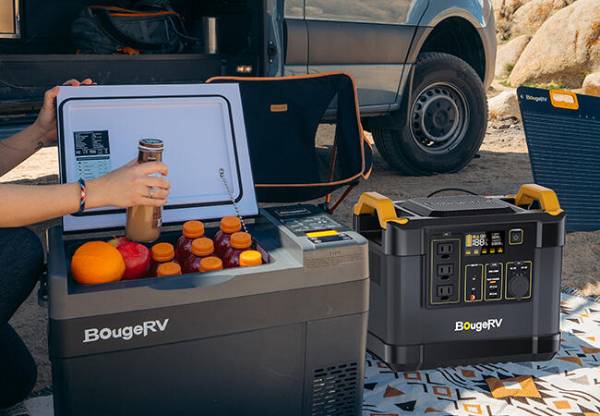
2. Charge Controllers
If you've got a 12V fridge powered by a solar setup with batteries, a solar charge controller is a must when you're charging a 12V battery with solar panels. It regulates the voltage and current coming from the solar panels to the battery. Without it, the solar panels might pump out more power than the battery can handle, especially on those super sunny days, which could lead to overcharging and eventually damage your battery.
Moreover, a properly sized MPPT (Maximum Power Point Tracking) charge controller will optimize the transfer of solar energy to the battery.
3. The Right Inverter (if necessary)
Most 12V fridges can run directly off the battery without needing an inverter. However, if you're using an AC refrigerator, an inverter would be required to convert the DC power to AC. Ensure that the inverter's wattage rating matches or exceeds the fridge's wattage.
3 Tips for Maximizing Efficiency
-
Upgrading Your 12V Fridge for Better Efficiency
If possible, invest in a high-efficiency 12V fridge with good insulation, a variable-speed compressor, and energy-saving mode. These features lead to lesser energy consumption and thus lower solar panel requirements. Explore more about BougeRV’s 12V fridge with energy-saving ECO mode: What Is the Best Electric Cooler for Your Car?
-
Maintaining Your Solar Panels Regularly
Keep your solar panels clean and free from obstructions. Dirt and debris can significantly reduce their effectiveness. Regularly inspect your system and tighten any loose connections. Read more about BougeRV’s solar panel maintenance blog:
How To Clean Roof Solar Panels?
How Often Should Solar Panels Be Cleaned?
-
Investing Innovative Solar Accessories to Enhance Performance
Consider add-ons like solar panel mounts that allow you to angle your rigid glass solar panels towards the sun optimally, or tracking systems that follow the sun's path across the sky for maximum energy harvest.
Conclusion
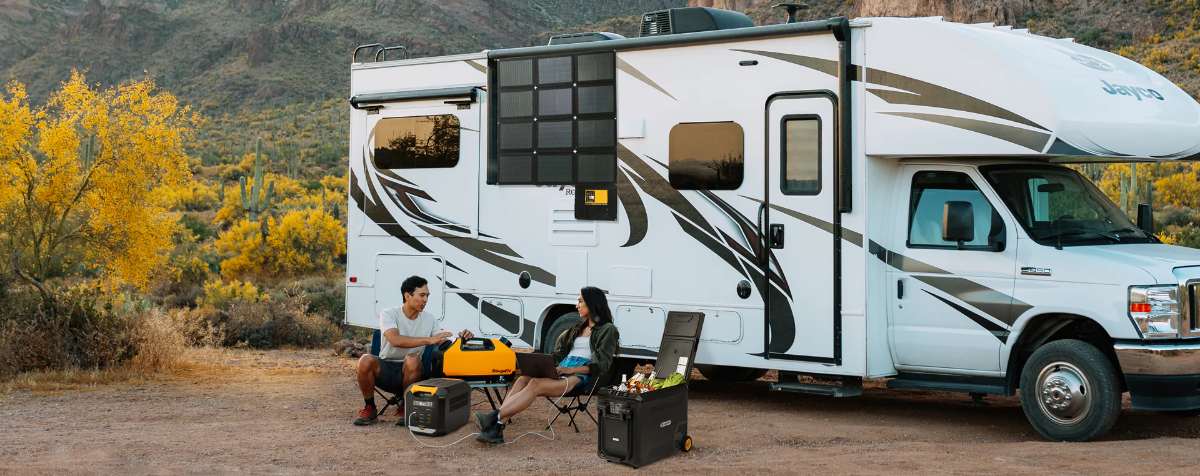
Armed with this knowledge of 12V refrigerator power consumption, and by properly sizing your solar panel setup and maintaining a reliable battery system, you're all set to enjoy chilled drinks and fresh food wherever you go. Remember, keeping your solar panels clean and well-maintained is key to maximizing their efficiency.
Ready to kick off your sustainable adventure? Head over to BougeRV and discover the ease and freedom of solar-powered living. For more tips on tapping into solar power for your mobile cooling needs, check out BougeRV now!
FAQs
How Many Watts of Solar Does It Take To Consistently Run a 12V Fridge?
A 12V refrigerator typically requires 40–80 watts to run. You can run a 12V compressor fridge with a 100-watt solar panel but it is essential to hook it up to a battery or portable power station. Usually, a 100Ah battery will do the job.
How Long Can a Refrigerator Run on a 200-Watt Solar Panel?
12V RV refrigerators typically use between 40 to 80 watts per hour and consume approximately 320Wh to 640Wh per day. A 200-watt solar panel produces around 160Wh per hour. Therefore, a 200W solar panel can potentially power an RV fridge for 24 hours.








